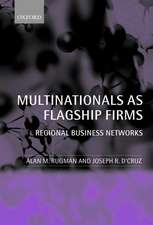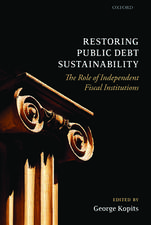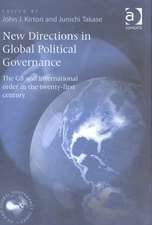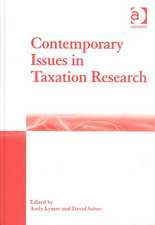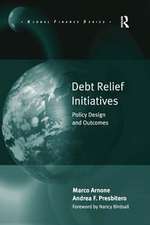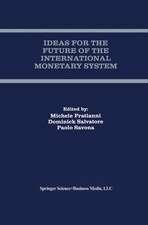New Perspectives on Global Governance: Why America Needs the G8: Global Finance
Autor Michele Fratianni Editat de John J. Kirton Autor Paolo Savonaen Limba Engleză Paperback – 25 sep 2017
| Toate formatele și edițiile | Preț | Express |
|---|---|---|
| Paperback (1) | 184.81 lei 43-57 zile | |
| Taylor & Francis – 25 sep 2017 | 184.81 lei 43-57 zile | |
| Hardback (1) | 496.94 lei 43-57 zile | |
| Taylor & Francis – 24 mai 2005 | 496.94 lei 43-57 zile |
Din seria Global Finance
-
 Preț: 416.22 lei
Preț: 416.22 lei - 25%
 Preț: 501.57 lei
Preț: 501.57 lei - 25%
 Preț: 503.19 lei
Preț: 503.19 lei - 18%
 Preț: 1000.27 lei
Preț: 1000.27 lei -
 Preț: 393.52 lei
Preț: 393.52 lei - 15%
 Preț: 470.31 lei
Preț: 470.31 lei - 25%
 Preț: 769.00 lei
Preț: 769.00 lei - 18%
 Preț: 1005.80 lei
Preț: 1005.80 lei - 18%
 Preț: 1000.27 lei
Preț: 1000.27 lei - 18%
 Preț: 1000.27 lei
Preț: 1000.27 lei -
 Preț: 323.23 lei
Preț: 323.23 lei -
 Preț: 469.34 lei
Preț: 469.34 lei - 18%
 Preț: 1011.99 lei
Preț: 1011.99 lei - 26%
 Preț: 764.20 lei
Preț: 764.20 lei - 17%
 Preț: 259.33 lei
Preț: 259.33 lei
Preț: 184.81 lei
Preț vechi: 223.26 lei
-17% Nou
Puncte Express: 277
Preț estimativ în valută:
35.36€ • 37.02$ • 29.26£
35.36€ • 37.02$ • 29.26£
Carte tipărită la comandă
Livrare economică 07-21 aprilie
Preluare comenzi: 021 569.72.76
Specificații
ISBN-13: 9781138266834
ISBN-10: 1138266833
Pagini: 344
Dimensiuni: 156 x 234 x 22 mm
Greutate: 0.45 kg
Ediția:1
Editura: Taylor & Francis
Colecția Routledge
Seria Global Finance
Locul publicării:Oxford, United Kingdom
ISBN-10: 1138266833
Pagini: 344
Dimensiuni: 156 x 234 x 22 mm
Greutate: 0.45 kg
Ediția:1
Editura: Taylor & Francis
Colecția Routledge
Seria Global Finance
Locul publicării:Oxford, United Kingdom
Cuprins
Contents: Preface; Introduction, Michele Fratianni, John J. Kirton, Alan M. Rugman and Paolo Savona. Part I The G8 in the Past and in the Future: Do we need the G8 Summit? Lessons from the past, looking ahead to the future, Nicholas Bayne; America at the G8: from vulnerability to victory at the Sea Island Summit, John J. Kirton; Russia in the G8: from Sea Island 2004 to Russia 2006, Victoria Panova; The G8 in a globalising world: does the United States need the G8? Bernhard May. Part II Prosperity and Security; Advancing American security interests through the G8, Risto E.J. Penttilä; Economic growth and national security, David B. Audretsch, Richard M. Stazinski and T. Taylor Aldridge; Borders and international terrorism, Michele Fratianni and Heejoon Kang; The G8 and the governance of cyberspace, Jeffrey A. Hart; US energy security and regional business, Alan M. Rugman. Part III Finance and Security: Combating black money: international co-operation and the G8, Donato Masciandaro; Terrorist finance: within the grip of the G8?, George M. von Furstenberg. Part IV The G8 and International Trade Policy: Summitry and trade: what Sea Island could do for Doha, Sylvia Ostry; Effective of defective? The G8 and multilateral trade negotiations, Heidi K. Ullrich. Conclusion: New perspectives on the G8, John J. Kirton, Michele Fratianni, Alan M. Rugman and Paolo Savona. Documentary appendices. Bibliography. Index.
Notă biografică
Michele Fratianni is from Indiana University, USA. John J. Kirton is from the University of Toronto, Canada. Alan Rugman is from Indiana University, USA. Paolo Savona is from University of Rome Guglielmo Marconi, Italy.
Descriere
A unique collection of new writing examining the role of the G8 Summit after it celebrated its 30th anniversary in 2004. New Perspectives on Global Governance challenges the assumption that the G8 is simply a forum for binding a unilateralist hegemonic America. Economic recession following the September 11th terrorist attacks, bitter divisions with its NATO allies and disappointments with the UN over the 2003 Iraq War means a more vulnerable America must rely on the G8 as a central instrument of foreign policy to achieve its security, economic and political interests in an increasingly uncertain world.




